Today’s encore post on a #Throwback Thursday doesn’t go that far back. But it sure feels that way. I published it in February 2019 – a story about how Millennials and activism were joined at the hip. And how there was a time in radio when protest was an integral part of many FM rock stations. (Ironically, the only real opinion on the radio these days mostly comes from conservative talkers, but that’s another story for another day.)
If I had been paying closer attention when I wrote this post, I might have included a young 15 year-old, Greta Thunberg. Six months earlier, Greta was just beginning her sojourn to create awareness of climate change and demanding the governments around the world take action. One month after this post appeared young Thunberg was nominated for the Nobel Peace Prize.
One year later, she beat out President Trump and was named “Time’s Person of the Year.” Mr. Trump went after her on Twitter, mocking her climate change campaign. Here we are three years later, and a look outside your window or watching your local meteorologist will tell you who won that argument.
Today’s #TBT post turned out to be predictive of the young activism we’ve seen in recent years with the Parkland, Florida kids and gun legislation, as well as 2020’s social justice protests. Today’s post has the data – and a story or two – that set the table for some of what we’ve seen during the past year or two, especially as it pertains to Millennials and Gen Z’s pushing back at a world, a country, or a society where change is needed.
Most stations and personalities have chosen to sit these moments out. But back in the day, it was a very different radio industry. Time it was, oh what a time it was. – FJ

JacoBLOG – February 2019
I spent a lot of time listening to radio (thanks, jacapps, for making it easy) yesterday – the day after the President’s much-ballyhooed State of the Union Address.
Of course, it was “the topic” on talk stations and public radio outlets. After all, that’s what they do.
On music stations, the SOTU speech didn’t happen. Morning shows on music stations found any number of secondary topics to talk about, along with standard benchmarks like “War of the Roses” or “Moron of the Day.”
It’s been this way for a LOOONG time now. As the commercial broadcast industry became a bigger and bigger business, most music stations have steered clear of controversy for fear of antagonizing advertisers and facing blowback from a divided audience.
But it’s all around us now – on NFL football fields, on cable news day in and day out, and at dinner tables all over America. These days, seemingly everyone has an opinion. Except music radio stations.
When we think about the seminal era of protest movements, most of us flash back to the most activist period of the past 50 years – anti-war rallies, civil rights protests and sit-ins that dotted the Sixties. Baby Boomers were in the vanguard of these moments, making their feelings known on the streets, in Washington, D.C., as well as at events like the Democratic Convention in 1968.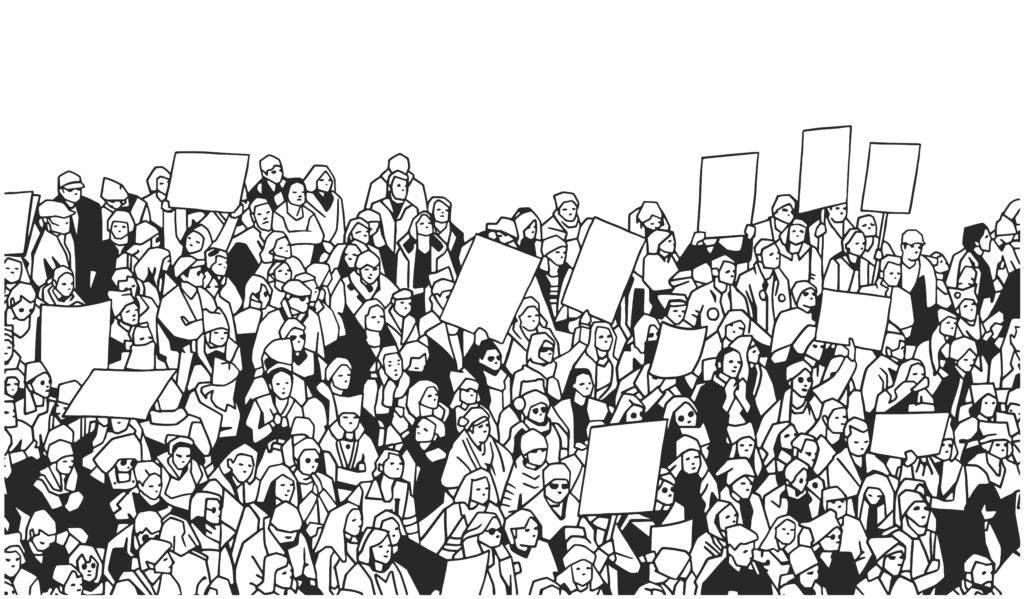
But what does that look like today? Do Boomers still have the monopoly on that protest gene, or has the torch been passed to Millennials and their younger brothers and sisters – Gen Z? How are younger generations of Americans redefining what it means to speak out and be heard?
And what – if anything – does this have to do with brands? Politics has become a taboo topic at most family gatherings, business meetings, bowling leagues, and kids’ soccer games. For all those reasons, most stations and their most popular personalities avoid the conversation rather than instigating it.
Yet, causes and societal issues are very much in the center ring of media and entertainment, whether it’s cable news, late night TV shows, and of course, social media and the Internet. Everything is political. More and more, brands are taking stands and making statements about the state of the country.
I was reminded of this by a couple of commentators to our Super Bowl ads post earlier this week. Some believe that political correctness has sanitized agency copywriters, causing marketers to go blander and safer.
Perhaps, but whether Howard Schultz ends up being a viable presidential candidate or not is overshadowed by the fact that Starbucks’ activism has been the engine that has vaulted him into the public eye.
Nike’s Colin Kaepernick campaign, followed by Gillette’s recent foray into gender politics, suggests that some marketers see value in taking stands – even if they are at the pinnacle of controversy. Perhaps that’s because Millennials – in particular – seem to favor companies that do more than just sell stuff.
And to that point, by a wide margin, Millennials applaud Nike’s gamble to feature Kaepernick – and they ended up becoming even greater consumers of Nike products. As for older generations, Nike’s marketing plan was met with indifference or derision.
Opinionated brands that speak out are appreciated by Millennials. That’s backed up by a survey from RetailMeNot, showing that two-thirds of 18+ Internet users agree brands should take public stands on key social values.
The eMarketer chart below and the analysis of Lucy Koch suggest majorities of young people would be more likely to recommend these brands to friends and purchase more of their goods.
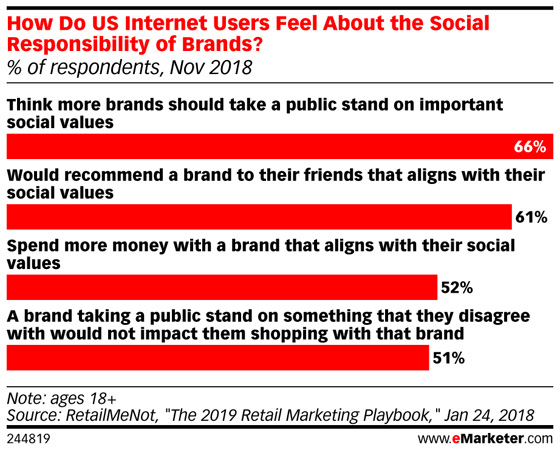
So, Millennials put their money where their hearts are. But what about boycotting products?
Another study – this one from CompareCards.com – says one-third of Millennials (and Gen Xers) stopped during business with a company they had once spent money with. A story in Retail Dive by Corinne Ruff notes that companies like REI and Patagonia have benefited from their positions on the environment – aligned with the sensibilities of their customers.
The generational chart from this study clearly shows a greater propensity – especially among today’s younger Millennials – to boycott goods or services the disagree with. Note that Boomers – once the activist protesters – look rather tepid in their vitriol today:
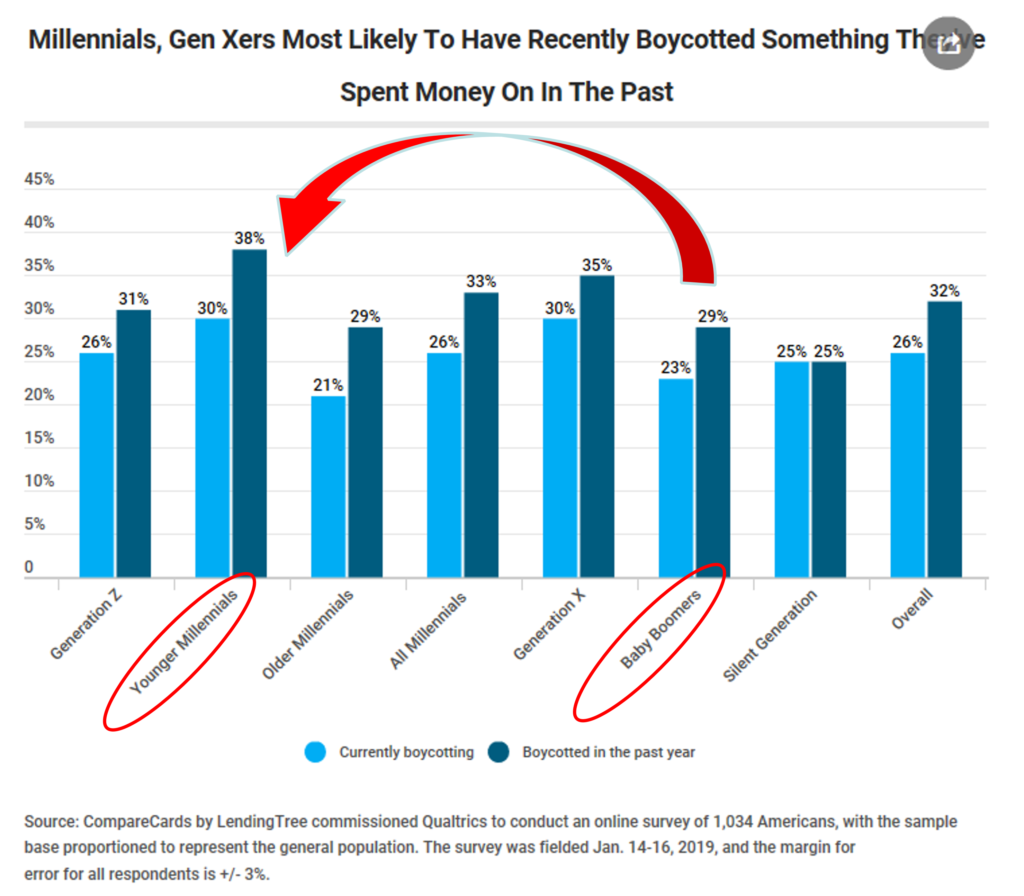
But for radio, this kind of activity – a radio brand advocating for a cause – just isn’t done. Many broadcast executives would tell you there’s simply too much at stake.
In the early days of FM radio when stations had a lot less value than they do today, taking a stand for causes like the Vietnam War were considerably more common. Protests were part of the fabric of many popular rock songs – “Ohio,” “For What It’s Worth,” and even Edwin Starr’s “War” all were sung out of the same hymnal.
In the early years, even Bob Seger sang about social issues in songs like “Persecution Smith” and “2+2=?.” Creedence Clearwater’s Revival’s 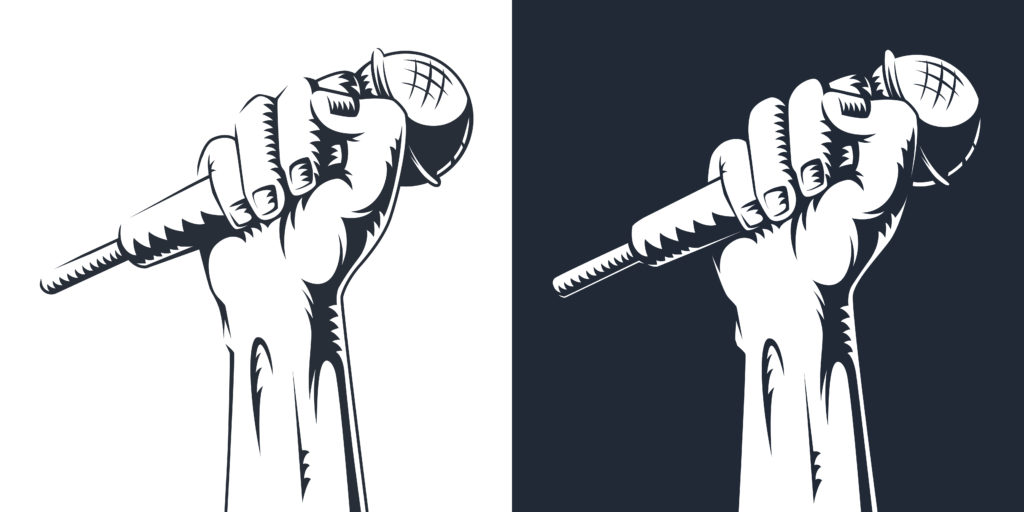 “Fortunate Son” was a song about privilege and class. And Motown got the message from Marvin Gaye’s “What’s Goin’ On” and the Temptations’ “Ball of Confusion.”
“Fortunate Son” was a song about privilege and class. And Motown got the message from Marvin Gaye’s “What’s Goin’ On” and the Temptations’ “Ball of Confusion.”
And the DJs of the day often reflected much of those same values and social concerns.
Believe it or not, one of the most famous examples of a radio station and a popular personality taking a stand didn’t occur back in 1968. It was two decades later in 1988.
Charles Laquidara was the host of WBCN’s “Big Mattress” morning show, and an outspoken, out-sized personality on Boston radio. Charles organized a campaign against apartheid on his morning show that railed against Shell Oil and its business dealings in South Africa. Creating a campaign called Shellshock, he took to the airwaves to encourage BCN listeners to cut their Shell credit cards in half and mail them in with the goal of encouraging the oil company to stop doing business there.
This became a cause de célèbre for Laquidara and BCN, garnering a lot of mass media coverage, including a New York Times feature – “A Disc Jockey Challenges An Oil Company.”
In the story, Charles explains that BCN’s owner – Infinity Broadcasting – tolerated his protest campaign, but did not endorse it. Run by the iconic Mel Karmazin, the company had a reputation for supporting controversial talent like Laquidara and Howard Stern.
The archived story news story below that ran on WGBH-TV is a true trip back in time. And if you’re wondering whether the campaign caught fire, watch the video and take note that Red Sox superstar Roger Clemons signed on to Charles’ campaign, as did Boston Mayor Ray Flynn. It is impossible to imagine something like it happening on broadcast radio today.
Back in Laquidara’s era, a campaign like Shellshock cemented loyalty with his audience. In subsequent focus groups I’ve conducted in the market over the ensuing years, I’ve heard listeners reminisce about this radio protest, and the days when radio DJs took a stand.
And that’s why these stories in eMarketer and Retail Dive about Millennials respecting companies that advocate for a cause resonated with me. It is very much a throwback to a different time in America when young people appreciated and gravitated toward those who expressed their opinions.
Amazingly, the CompareCards study asked more than 1,000 Americans last month whether they’d be up for a credit card boycott – similar to what Laquidara pulled off 30 years ago:
The fact that a majority agrees (or agrees strongly) they’d cease use of a favorite credit card if that company supported a cause that ran against their political/moral grain. Looks like Charles might have been onto something.
Do not interpret this post as encouragement for morning radio DJs to “Be like Charles” and adopt a cause. That’s not its point.
Local radio has the ability like no other medium to connect with its audience, reflecting their feelings and values, while making it entertaining. Could these kinds of campaigns ever happen again, igniting interest among today’s Millennials? That’s up for debate, of course.
But CompareCards’ chief industry analyst, Matt Schultz, boiled it down this way:
“Americans simply want to be heard.”
And when it comes to today’s Millennials – a generation that hasn’t had it so easy and has often been derided and misunderstood – maybe that’s what
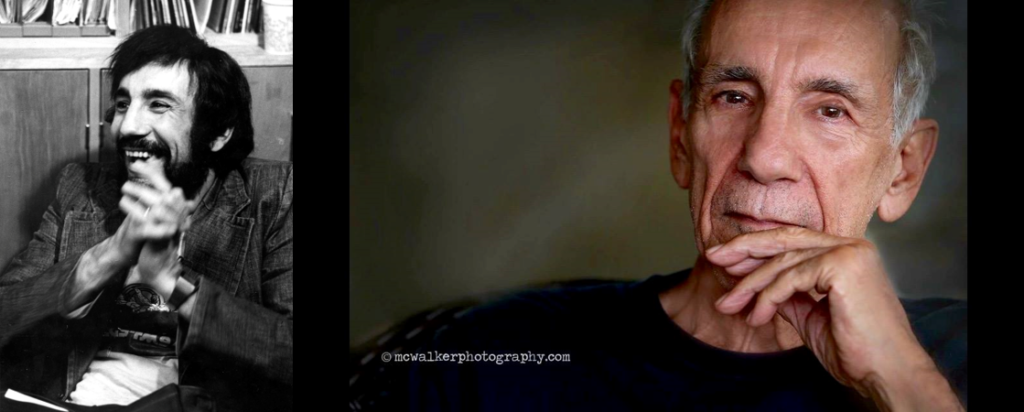
this is about. They feel alienated and ignored – not dissimilar to how Boomers were feeling back in 1968.
Ironically, the racial injustice Charles Laquidara was railing against in Boston 30 years ago is as big an issue in our politics and in our discourse today. Charles’ controversial stance and ensuing campaign may seem like it came from a morning guy from another dimension would do – the idea of this happening today is unthinkable – despite the fact there’s a generation – or two – waiting to hear it.
It makes you wonder whether a timely, heartfelt, authentic message in 2019 that emanates from a radio station or a popular personality – whether in a car, from a smartphone, or on Alexa – could motivate young people to once again ask the question:
“Stop, children, what’s that sound?”
And in the process, make morning radio relevant again.
For more on Charles, click here.
I would be remiss if I didn’t give a shout-out to a new PBS documentary, “WBCN and the American Revolution” directed by Bill Lichtenstein. Info here.
- Media And Technology In 2025: Believe It Or Not! - April 18, 2025
- In Radio, You Just Never Know - April 17, 2025
- The Secret To Making A Great Podcast (And Great Radio) - April 16, 2025





This is an interesting retrospective, Fred, but I think a suggestion that radio stations today prefer to (or should) hide their public-policy attitudes ignores the pachyderm in the parlor: We have a large contingent of talkers that proudly espouse their political leanings–usually calling themselves “conservative” for no reason that makes sense from an etymological viewpoint–and they do not appear to be suffering for wearing their larynxes on their sleeves. Listeners who don’t agree just don’t tune in.
I believe the fundamental reason why radio stations should avoid the political quagmire is that (a) if our society’s deep divisions are to be bridged it may be possible only through individual, respectful conversations; and (b) radio is by definition a point-to-multipoint medium that simply does not lend itself well to this task. I doubt even a resurrection of the fairness doctrine would alleviate things much.
Better idea: Play the music, and mix in preferential pricing and PSAs for local charitable organizations.
John, this is an interesting perspective, John, and one that I thought about before dashing off a response to you. Is there a reason so-called “liberal talk” isn’t on the radio because no one has done it, or done it right? Or is it about the reasons you bring up. I heard Randy Michaels talking about the evolution (?) of talk radio in the U.S. His first foray was WLW, and he went to the right wing, white male zone because he felt it was the best path in Cincinnati at that time. And then the world followed.
His point was that there are other ways to do talk on the radio (in some ways, sports i another avenue), but that it just hasn’t been tried. Or tried in a while. Was Air America doomed? Or could it have worked – with a different approach and/or at a different time. If John Sinton is reading this, I’d love to hear from him on the topic.
Radio is having less and less success with people under 40. Those under 40s are more likely to be aligned with causes and are more likely to support brands who publicly align with and support those causes. A 6 or 7 share in a top 35 market is a huge success, especially with a median audience age somewhere in the 30s. If radio wants to have a shot at attracting those people, this would be a great way to do it. And selling a station with that kind of audience composition doesn’t require convincing anyone that they should target an older audience.
John is right, its not as though radio has traditionally been afraid to be a platform for controversial hosts or positions. Rush Limbaugh, Howard and Charles all made lots of money for their respective stations. I remember doing a perceptual study when NASCAR was at the peak of its popularity in SC which might have been it popularity epicenter. NASCAR races were filling big venues and I was shocked when only 21% of the market said they had any interest in it. The lesson is a relatively small but passionate fan base can very profitably support a wildly successful brand.
What should be surprising to anyone not familiar with the radio business in 2021 is that rather than explore that opportunity with a couple of their hundreds of stations in the top 100 markets, it will continue to do what its been doing – formats that feature the 325 top testing songs from the nearest top 10 market with compelling promotions like “win tickets before you can buy them to the _______ show on the 23rd at the Ivermectin Arena.”
There are probably over 100 full signals in the top 100 markets consistently delivering less than a 2 share. Mike drop.
Its unclear whether its too late to make radio important to millennials, but what is clear is the longer radio waits to try, the more likely that window closes.
Bob, I am similarly surprised about the reticence to try anything truly new in the top 50 markets. When was the last time a truly different format was launched in U.S. commercial radio? I don’t know whether it’s a lack of research, money, patience, or interest, but format innovation is in such short supply that it is rarely discussed. Instead, we head over to the “Wheel of Formats” and launch a Hot AC or a Classic Rock that REALLY Rocks station. And they rarely work.
TO your last point, I believe Millennials may be a lost cause, but Gen Z’s might listen to radio IF IF IF there was something interesting, relevant, and worth listening to. But broadcasters have to want to try this.
It’s like digital. A decade ago, there was very little appetite to truly dive in with both feet. Or even a big toe. Now, everyone’s doing it, buying digital companies, hiring digital programmers and sellers, etc. Often to thee detriment of broadcast content, unfortunately. There’s a reason why Bill Wilson was named executive of the year. His company got to the dance faster than the others. That same honor is waiting for the broadcaster who decides it’s time to get younger.
And as mentioned earlier, I wouldn’t start with Millennials. I’d go right to Gen Z. But there’s no “format in a box” solution here. This one will require research, talent, data, and money. (Have I scared everyone off?)
Haha! Didn’t scare me off, Fred! I think you’re right on the money. Millennials have already turned the radio off and have no interest in going back. Gen Z is just looking for the entertainment that appeals to them, regardless of the source. If SOMEONE would try a format that looks like what Gen Z is watching and listening to…well, who knows?
Indeed, David. We’re going to know until we know, you know?
I know you read the New Yorker. Did you happen to see this article about how our perceptions of generations are usually wrong?
https://www.newyorker.com/magazine/2021/10/18/its-time-to-stop-talking-about-generations
I equate it to Moneyball. We used to think someone had the tools to be a great player. Now, we can analyze the numbers a lot better and see the flaws in our perceptions.
Very fascinating with more than a few surprises–which maybe shouldn’t have been–in the New Yorker article. Can’t help but think of The Screwtape Letters, a book I’m embarrassed to say I’ve had for decades, but just picked up a couple days ago and finished reading this morning. Classified as “satire,” it’s the most penetrating look at the human psyche I believe I’ve ever read. Some people are just beyond gifted with the ability to “read” the human soul, and perhaps no one was more so gifted than C.S. Lewis. Thanks for sharing the article, Mike.
Mike, I did read that, and I’m a believer that generational stereotypes make good news fodder (or blog fodder) but rarely hold up. Thanks for that reminder.